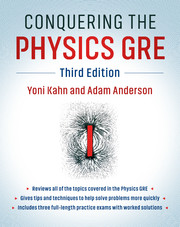Book contents
- Frontmatter
- Contents
- Preface
- How to Use This Book
- Resources
- 1 Classical Mechanics
- 2 Electricity and Magnetism
- 3 Optics and Waves
- 4 Thermodynamics and Statistical Mechanics
- 5 Quantum Mechanics and Atomic Physics
- 6 Special Relativity
- 7 Laboratory Methods
- 8 Specialized Topics
- 9 Special Tips and Tricks for the Physics GRE
- Sample Exams and Solutions
- References
- Equation Index
- Subject Index
- Problems Index
8 - Specialized Topics
Published online by Cambridge University Press: 16 February 2018
- Frontmatter
- Contents
- Preface
- How to Use This Book
- Resources
- 1 Classical Mechanics
- 2 Electricity and Magnetism
- 3 Optics and Waves
- 4 Thermodynamics and Statistical Mechanics
- 5 Quantum Mechanics and Atomic Physics
- 6 Special Relativity
- 7 Laboratory Methods
- 8 Specialized Topics
- 9 Special Tips and Tricks for the Physics GRE
- Sample Exams and Solutions
- References
- Equation Index
- Subject Index
- Problems Index
Summary
The Specialized Topics questions on the Physics GRE are probably the most unique aspect of the test. It's hard to think of any other test (other than TV game shows) in which a full 10% is random assorted knowledge. This may seem daunting, but with smart preparation, these questions actually offer a huge advantage.
The special topics questions are almost entirely pure knowledge recall, otherwise known as fact regurgitation. This is the kind of knee-jerk memorization you probably hated in high-school chemistry or biology. When confronted by a special topics question, you'll either know it or you won't. If you know it, that's one question down in under 10 seconds, which gives you a huge bonus on time for the more difficult calculational questions. If you don't know it, you probably won't be able to figure out the answer just by reasoning through it, and you may waste 5 or more minutes second-guessing yourself when stuck between two equally appealing answer choices. The optimum strategy, then, is to amass a basic knowledge of as many areas of cutting-edge physics as possible, just enough to make the associations between “buzzwords” and concepts that will allow you to recall the required knowledge.
Luckily, this kind of studying is dead easy. Every couple days, take a break from your normal Physics GRE practice and just read. Pick up a basic textbook in an advanced subject you're unfamiliar with (for example, if you're aiming towards high-energy, choose an introductory solid-state physics or electrical engineering textbook), and don't bother working any problems; just read the book as if it were a novel. You might learn something new and interesting, but that's not really the point: by reading this way, you'll be forming connections and associations in your memory that you might not even be aware of. It's likely you won't be able to remember exactly what you read, but if prompted by a keyword that shows up on the GRE, your memory will spring into action with that feeling of “I've seen this somewhere before.” That's really all you need for these kinds of questions.
- Type
- Chapter
- Information
- Conquering the Physics GRE , pp. 146 - 158Publisher: Cambridge University PressPrint publication year: 2018

